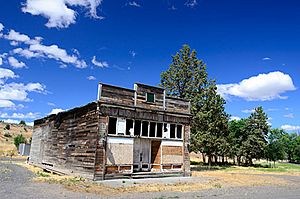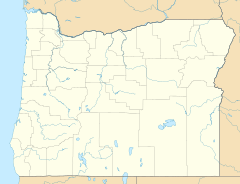Gateway, Oregon facts for kids
Quick facts for kids
Gateway, Oregon
|
|
|---|---|

Old abandon building in Gateway
|
|
| Country | United States |
| State | Oregon |
| County | Jefferson |
| Elevation | 1,795 ft (547 m) |
| Time zone | UTC-8 (PST) |
| • Summer (DST) | UTC-7 (PDT) |
| ZIP code |
97741
|
| Area code(s) | 541 |
Gateway is a small, quiet place in Oregon, United States. It's called an unincorporated community. This means it's a group of homes and buildings that isn't officially a town or city with its own local government. You can find Gateway in Jefferson County, about 16 miles (or 26 kilometers) east of a place called Warm Springs.
Contents
Welcome to Gateway, Oregon!
Gateway got its name because of a special natural feature. North of Madras, there's a dip in the land. This dip was created by Trout Creek and its smaller streams. It formed a natural "gateway" or opening. This opening was perfect for railroads and cars traveling north and south through Central Oregon.
Gateway's Post Office History
The name "Gateway" was first used for the local post office in 1913. This post office was originally set up about three miles from where Gateway is today. Before it was called Gateway, it had a different name: Youngs. It was named after a local person, Louis A. Young. The Gateway post office served the community for many years, but it eventually closed its doors in 1956. A person named Noah Vibbert was the owner of both the store and the post office at that time.
Trains and Gateway
The train station in Gateway was also known by another name, Galloway. This was on the Oregon Trunk Railway line. Don't get it mixed up with another place called Galloway in Morrow County! Today, the train tracks that run through Gateway are owned by the BNSF Railway. Trains still use these tracks to travel across the country.
What Gateway Once Had
Long ago, Gateway was a busier place. The community had several important buildings and services. There was a school where children went to learn. There was also a church, a place for people to gather and worship. A railroad depot served as a stop for trains and passengers. And, of course, there was a store where people could buy supplies and groceries. These places were the heart of the community.



